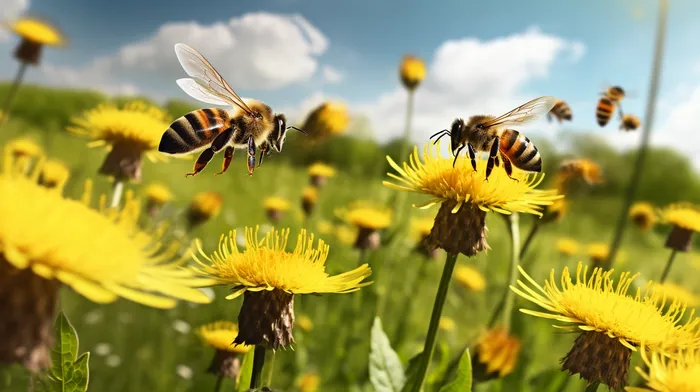Honeybees play a crucial role in pollinating plants, ultimately impacting the food supply. They have experienced a significant decline in recent years, with “colony collapse disorder” often being blamed. While the exact cause is unknown, many researchers believe pesticides have contributed to this decline. In particular, neonicotinoids, a group of crop pesticides, have received a considerable amount of attention.
The Role of Imidacloprid
A study conducted at the University of California San Diego found a specific neonicotinoid known as imidacloprid may be partly responsible for bee population decline. Imidacloprid has already been banned for use in certain crops in some European countries due to its harmful effects.
This pesticide is commonly found in the high fructose corn syrup that beekeepers feed their bees as a supplement to the natural nectar they collect. Unfortunately, just a single, small dose of imidacloprid, which is comparable to the amount present in nectar from a treated plant, can have adverse effects on the bees.
Effects on Honeybee Feeding Habits
Through experiments, the biologists discovered that honeybees treated with imidacloprid become picky eaters. Researcher Daren Eiri explains, “In other words, bees preferred to only feed on sweeter nectar and refused nectars of lower sweetness that they would normally feed on and that would have provided important sustenance for the colony.”
In addition to their feeding habits, the treated bees also danced less often. Bees use a waggle dance to recruit nestmates to a good food source, so by dancing less, the bees drastically reduce the amount of resources they bring back to the colony, further reducing their food stores.
Ultimately, these findings bring the previous safety standards of pesticide levels into question. Biologist James Nieh states, “Exposure to amounts of pesticide formerly considered safe may negatively affect the health of honey bee colonies.”
Broader Implications
Considering the importance of honeybees in pollination and their role in the food supply, this decline in bee populations has far-reaching implications. According to the Pollinator Partnership, “Honey bees are essential for pollinating more than 100 varieties of fruits and vegetables in the United States, and their role in pollinating plants helps to make possible the one in three bites of food we consume every day.”
How to Take Action
What can we do to help honeybees and protect their wellbeing? Here are some practical steps to consider:
- Avoid using harmful pesticides in your garden: Neonicotinoids can travel through soil and get absorbed by plants you may not even intend to treat, putting your local bee population at risk. Be mindful of the products you use in your garden and opt for more bee-friendly alternatives.
- Plant a bee-friendly garden: By planting flowers and plants that bees enjoy, such as lavender, sunflowers, and perennial gardens, you can provide them with a natural food source and create a safe environment for them to thrive in.
-
Support local beekeepers: Consider buying honey from local beekeepers rather than mass-produced grocery store brands. Not only does this support their efforts to maintain healthy bee colonies, but it also gives you a better-quality product.
-
Educate yourself and others: By staying informed about honeybees and their importance, as well as the dangers they face, you can help raise awareness and advocate for the protection of these vital creatures. Share information with your friends, family, and community.
The findings of the University of California study show that we must take action to protect honeybees and the environment they inhabit. By becoming more mindful of our pesticide use and taking active steps to create a healthier environment for bees, we can help ensure their survival and secure the future of the food supply.



